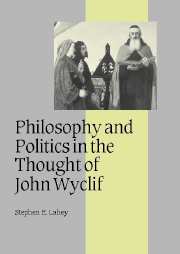Book contents
- Frontmatter
- Contents
- Acknowledgements
- Abbreviations
- 1 The historiography of Wyclif's dominium thought
- 2 Why dominium?
- 3 Wyclif's realism and divine dominium
- 4 Proprietas in Wyclif's theory of dominium
- 5 Iurisdictio in civil dominium
- 6 On kingship
- 7 Conclusion
- Bibliography
- Index
- Cambridge Studies in Medieval Life and Thought Fourth series
1 - The historiography of Wyclif's dominium thought
Published online by Cambridge University Press: 30 July 2009
- Frontmatter
- Contents
- Acknowledgements
- Abbreviations
- 1 The historiography of Wyclif's dominium thought
- 2 Why dominium?
- 3 Wyclif's realism and divine dominium
- 4 Proprietas in Wyclif's theory of dominium
- 5 Iurisdictio in civil dominium
- 6 On kingship
- 7 Conclusion
- Bibliography
- Index
- Cambridge Studies in Medieval Life and Thought Fourth series
Summary
In 1377, John Wyclif had need of powerful political support. He had been summoned to Saint Paul's by Archbishop Sudbury to account for heretical arguments threatening to the foundations of the church in England. So on February 19, Wyclif appeared at the arraignment with John of Gaunt, Duke of Lancaster and arguably the most powerful man in the kingdom. Wyclif, once an Oxford metaphysician, had become an associate of John of Gaunt two years earlier, and had begun arguing for the reduction of the church's political influence and her material wealth shortly thereafter. Gaunt was, and still is, widely believed to be eager to supplement his political power at the expense of the church, and Thomas Walsingham encourages us to believe that Gaunt's support of Wyclif that February afternoon was that of a patron for his valued servant.
Had Gaunt been self-interestedly using Wyclif as his polemicist, he had made an odd choice. Wyclif's arguments for the absolute power of the king were framed neither in the theocratic kingship language of the Anglo-Saxon and Anglo-Norman tradition, nor were they couched in the more contemporary Aristotelian terms favored by other champions of secular authority. On the contrary, Wyclif used language that had, until then, usually been employed by papally sponsored churchmen. His arguments were framed in terms of Grace-founded dominium, redolent of Archbishop Richard Fitzralph's defense of ecclesiastical property-ownership.
- Type
- Chapter
- Information
- Publisher: Cambridge University PressPrint publication year: 2003



